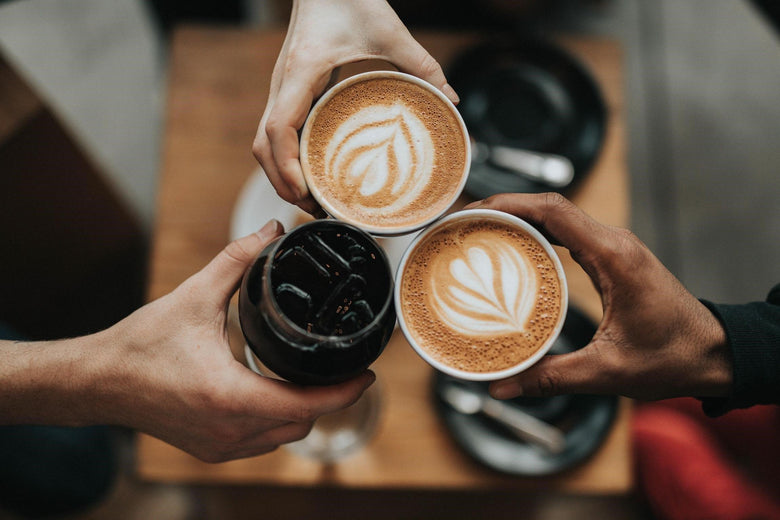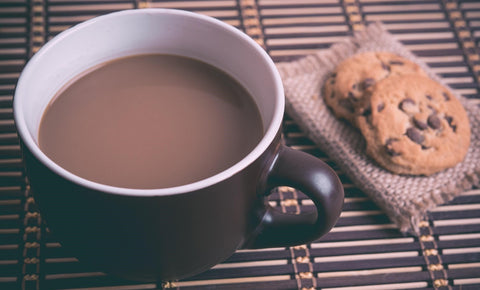There’s a whole lot of mumbo-jumbo out there when it comes to coffee and health. Baseless claims and wild speculation abound. But there’s plenty of good, verified science as well.
In fact, coffee has been deeply studied for decades around the entire world. If you do a Google Scholar search for coffee’s health benefits, you won’t find just 100 studies.
You’ll find 100,000.
I hate it when bloggers write about coffee health benefits without consulting even a few of these studies. That’s why, in this article, I link to a study for every major claim I make that has to do with your health.
However, I’m not a doctor.
If you ever have serious health-related questions concerning your coffee intake, you should always take them up with your regular doctor who knows your personal circumstances better than any stranger on the internet.
That being said, the research presented here is backed by peer-reviewed science from a variety of journals, universities, and countries.
And, not to give anything away, the results are looking pretty good.
Read: The Difference Between Light, Medium, And Dark Roast Coffee
However, nothing is without consequence. Even your delicious daily brew. But we’ll get to that later.
Coffee And Health: The Good
New headlines announce the health benefits of coffee every couple weeks across newspapers and online magazines. So you shouldn’t be surprised to find that coffee does, in fact, have many health-promoting attributes.
Let’s look at an overview of some of the most impactful benefits.
Reduced Risk Of Some Cancers
Great news! In a 180-degree decision, the World Health Organization published in a June 2016 report that coffee is actually not a carcinogenic risk (going back on an earlier claim). They said instead that coffee can help prevent some types of cancers.
This news echoes the decision of the 2015 Dietary Guidelines For Americans, which also concludes that modern coffee consumption (3-5 cups per day) was linked with lower risk of certain cancer types.
But which cancer types?
And a new cancer type is added to the list every couple years.
Cancer is scary, tragic business. Thank goodness our coffee is on our side in this fight.
Read: Should You Store Your Coffee Beans In The Freezer?
Reduced Risk Of Diabetes
Doctors that study the effects of coffee on your risk of diabetes generally agree: coffee helps. Though their results tend to fluctuate a bit, the key here is that coffee is a companion against diabetes - not a risk factor.
One study by the School of Public Health at the University of Minnesota revealed that women who drink 6+ cups of coffee per day are 22% less at risk for type 2 diabetes.
This study discovered the same with seven cups per day.
But how many of us are really drinking that much coffee? Is there a study that fits the rest of us at 1-3 cups per day?
Yes, there is.
A Harvard study concluded that just one cup of coffee could be associated with a 13% risk reduction.
Most of this anti-cancer benefit is a direct result of coffee’s many antioxidants. These compounds, in a sense, are able to provide stability to unstable compounds (free radicals) in your body. And since these free radicals are sometimes the catalyst for cancer growth, making them stable again (un-radical) is a good thing!
But we’ll have to talk about that cream and sugar in a moment….
Reduced Risk Of Cardiovascular Disease
Heart disease, tragically, is the #1 cause of death in America. Thankfully, our coffee habits aren’t hurting us - they’re helping us here as well.
A thorough Korean study concluded that “moderate coffee consumption was associated with a lower prevalence of subclinical coronary atherosclerosis.”
More Effective Workouts
There’s been a lot of talk recently about how coffee can improve your workouts. Some people say it increases your endurance, some people say it just helps you burn fat more quickly.
Read: Blends VS Single Origin Coffee: Which Is Right For You?
Let’s see some hard data.
Cardiff Metropolitan University discovered in a 2015 study, that people who drank coffee were able to complete more repetitions when lifting weights. They are certain it’s a benefit from the caffeine, but they admit that more research needs to be done to determine exactly why.
One theory that is yet to be confirmed by peer-reviewed study is that this endurance boost from coffee is only available during long workouts, but doesn’t come into play with quicker, more intense sessions.
Another study by the University of Georgia found that drinking 2 cups of coffee before a workout can reduce post-workout muscle pain by nearly 50%. That’s an easy fix for anyone who feels muscular discomfort after exercise!
And all those articles saying coffee helps you lose weight?
Yep, they’re legit.
Drinking coffee (well, consuming caffeine) is associated with weight loss generally. More specifically, it speeds up your metabolism and encourages other fat-consuming processes. You can read all about it in this Netherlands study.
Coffee And Health: The Bad
Unfortunately, coffee’s not all good. There are some downsides to the rich, intense beverage we all love dearly. Thankfully, these downsides aren’t that bad (at least, not compared to the things coffee protects us from).
Upset Stomach
You know what I’m talking about. We’ve all had that post-coffee upset stomach. It’s uncomfortable - and sometimes it’s even on the side of painful.
A few things can cause it:
- You’re extra-sensitive to acid (rare)
- You’re extra-sensitive to caffeine (uncommon)
- You drink coffee on an empty stomach (common)
Seriously, coffee is an intense drink. It’s full of acids, caffeine, and all sorts of other things. Don’t drink it on an empty stomach! That’s just asking for trouble.
You can read more about why coffee causes upset stomachs and what you can do about it in this blog post.
Caffeine-Induced Anxiety
Unfortunately, caffeine gives some of us symptoms very similar to those of anxiety neurosis, an anxiety disorder. I’m willing to guess most people who experience these symptoms don’t even realize how much they affect them.
Any of these sound familiar to you?
- Nervousness
- Irritability
- Muscle Twitching
- Insomnia
- Palpitations
When I was drinking 3+ cups of coffee per day as a cafe manager (and not getting very much sleep), I started experiencing muscle twitching.
I couldn’t hold a single piece of paper still with my arm stretched out.
It was embarrassing, and I realized that I was also feeling more anxious than normal. I wasn’t able to distill my random bouts of nervousness into a reasonable concern.
Eventually I visited my primary doctor. She told me that my circumstances were creating a bad loop of poor habits and bad health.
I drank coffee, I worked hard, I didn’t sleep well. So I drank even more coffee, which made me sleep even less well.
The solution to my circumstantial anxiety disorder? Get to bed at a good time and slow way down on caffeine.
Read: 3 Reasons Buying Cheap Coffee Is Bad For The World
And it worked. I still drink 3+ cups of coffee some days, but now that I’m taking better care of myself, the anxiety and jitters haven’t appeared in months.
Cream And Sugar
Here’s where things get nasty.
Cream and sugar nearly cancel out all the health benefits of black coffee.
There’s no end to the studies on how high levels of sugar negatively impacts your health and reduces your quality of life. It messes with your metabolism and causes you to gain weight, increases heart disease, can be fuel for cancer, helps bring about diabetes, and disrupts life in many other ways.
Read: Why You Need To Be Drinking Coffee Black (And How To Start)
Let’s look at this like a simple logic problem:
- If coffee is good,
- And if sugar is bad,
- Then drink coffee without sugar
Easy. Problem solved.
Sleep Impairment
Coffee’s great for staying awake and maintaining energy, but it’s not so great for winding down and getting quality sleep.
But wait. Are you someone who thinks coffee doesn’t really affect your sleep?
No offense, but you’re wrong.
I’ll tell you why.
I used to drink coffee at 9 PM and believe it wasn’t affecting my sleep at all. Then, just to experiment, I stopped drinking coffee after 6 PM or so.
The result?
I slept better. I felt better.
A study by Wayne State College of Medicine made a few fascinating discoveries:
- Coffee damages sleep. We already knew that, but this study concluded that drinking coffee even SIX hours before bedtime could reduce overall sleep by one full hour.
- People are terrible at self-diagnosing their sleep. Though many study participants claimed the coffee did not affect their sleep, the numbers on the screen clearly indicated that they had lost a full hour and that the other hours were of lower quality sleep.
Caffeine messes with your sleep, whether you realize it or not. Why not try eliminating caffeine after 6 PM or so and see how life goes for a while?
---
The health benefits of coffee are becoming more and more clear, but we have to keep in mind that coffee’s no substitute for proven medical help, and it’s definitely no cure-all.
Take care of yourself. See a doctor when necessary. And enjoy your black coffee.
Maximize your coffee enjoyment by experiencing freshly roasted, specialty-grade coffee beans. Not only are high-quality beans healthy for you, but they have flavors on a whole other level.




